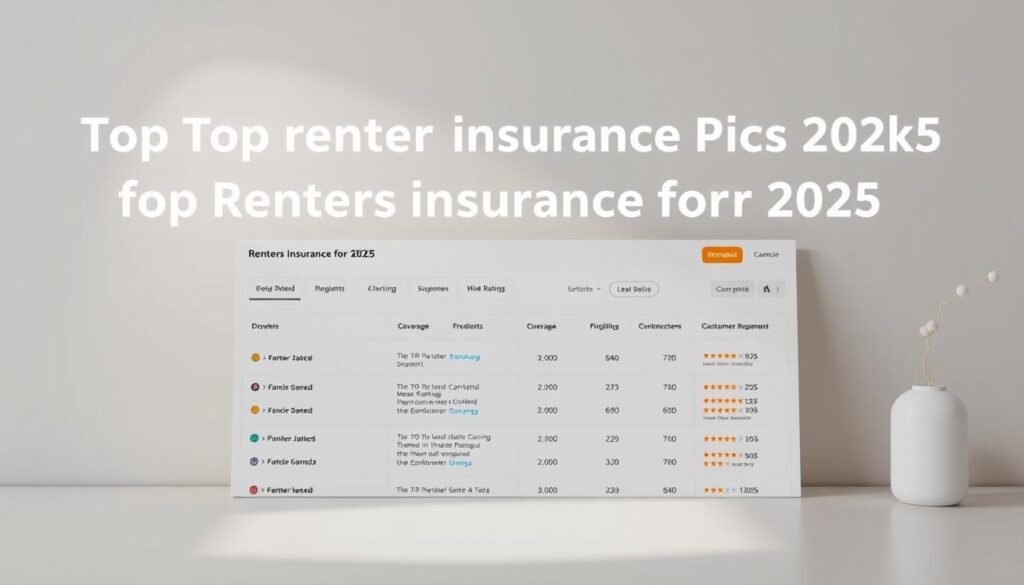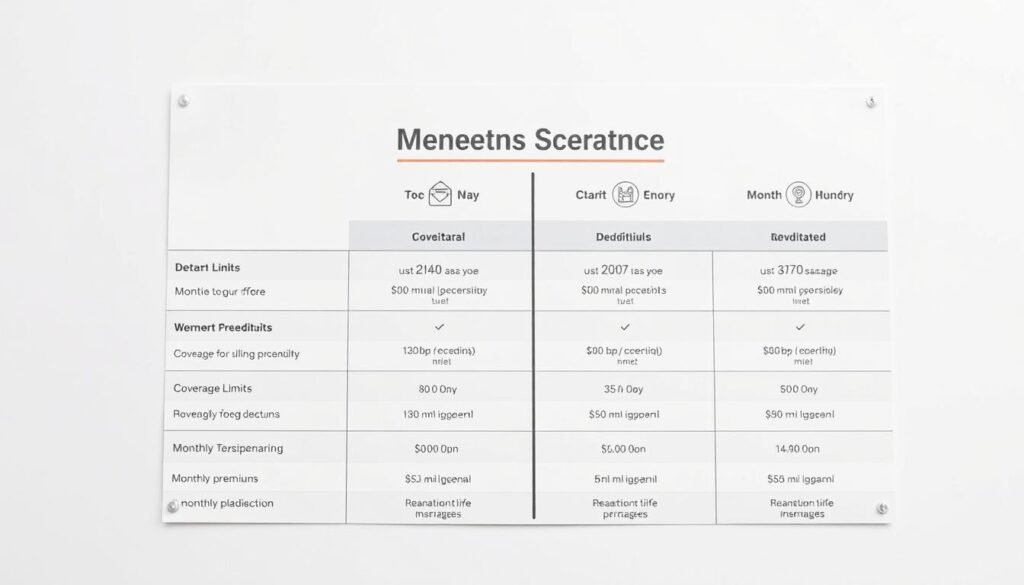
Best Renters Insurance USA International Students: Top Picks

"An ounce of prevention is worth a pound of cure," wrote Benjamin Franklin a reminder that small steps now can save you from stress later.
You need clear choices and simple numbers. This guide shows top picks for renters insurance and what each carrier does best, so you can match coverage to your budget and belongings.
We’ll highlight monthly costs for common tiers, from low-cost $20,000 personal property plans to richer limits, and explain key parts of a renters insurance policy like liability and added living expenses.
Build strong financial foundations: budgeting, saving, managing debt, credit building, and long-term money strategies.
Explore Finance Guide →You’ll also see how complaint data and company stability affect claims, and why State Farm often ranks high for value. Use this intro to read full details and quickly find the right plan without sifting through dozens of quotes.
- Why you need renters insurance as an international student right now
- Top picks at a glance for 2025
- How we chose the best renters insurance for you
- State Farm: Best overall and best value for money
- Auto-Owners: Strong runner-up with standout endorsements
- Chubb: Best for customer satisfaction and people with poor credit
- USAA: Best renters insurance for military members and families
- Best renters insurance USA international students
- What renters insurance covers (so you’re not caught off guard)
- Replacement cost coverage vs actual cash value
- What’s a good price? Average renters insurance costs by state
- Discounts that can lower your renters insurance rates
- How to compare renters insurance quotes the smart way
- Coverage options international students should consider
- Special situations: roommates, pets, and tight budgets
- Ready to get renters insurance? Steps to buy today
- Your next step toward affordable protection
Why you need renters insurance as an international student right now
A short accident a kitchen fire or a stolen laptop can upend your semester and wallet if you lack proper coverage. A compact policy protects your personal belongings and helps you keep studying after a loss.

Your policy usually includes personal property coverage, liability coverage, medical payments, and additional living expenses. Theft is often covered on and off premises, so luggage stolen while traveling can still be eligible.
Premiums are student-friendly. The typical cost is about $143 per year for $15,000 of property or $186 for $30,000 roughly $12–$16 per month. That makes much renters insurance cheaper than many monthly subscriptions.
- Protect gadgets and paperwork: reimbursement for stolen or damaged items.
- Liability help: legal defense if a guest is hurt or you damage another person’s property.
- Additional living expenses: hotel, meals, and essentials if your home is uninhabitable.
Landlord policies do not cover your stuff, so this insurance cover fills a real gap. Knowing these basics helps you find best coverage and avoid surprises while you study in the United States.
Top picks at a glance for 2025
Here are top 2025 picks that balance low monthly premiums and solid claim handling. Use this quick list to scan headline prices and decide where to request quotes.
- State Farm - Value leader with very low sample monthly rates: about $8 for $20K, $12 for $50K, and $19 for $100K. Great if you want low renters insurance rates and broad agent access.
- Auto-Owners - Solid runner-up. Roughly $9/month for $20K and notable endorsements like Contents Replacement and Renters Plus. Works through agents in 26 states.
- Chubb - Top marks for claims and customer satisfaction. Expect around $14/month for $20K. J.D. Power praises its claims handling and the NAIC complaint ratio is low at 0.21.
- USAA - Military-focused choice at about $9–$10/month for $20K. Offers worldwide coverage plus flood and earthquake protection, but eligibility is limited to service members and families.
- Quick take: these picks match headline pricing, service metrics, and policy features so you can compare fast.
- Remember: renters insurance rates can vary by ZIP use these as benchmarks before you bind a policy.
- Next step: pick one or two names to read full reviews and get personalized quotes to see your average cost renters would be.

How we chose the best renters insurance for you
To pick carriers that fit your budget and needs, we ran tens of thousands of quote scenarios and matched them to real complaint records. That lets you see not just low headline rates but how companies perform when you file a claim.
Data sources we used
Quadrant Information Services provided rate modeling across coverage tiers. We reviewed work covering 47,850 rates and 14 large insurers to keep comparisons consistent.
National Association of Insurance Commissioners (NAIC) complaint ratios showed how insurance companies handle service and claims. We paired that with J.D. Power claims satisfaction for customer-facing insight.

What mattered most
We weighted rates heavily 80% of the score and complaints 20%. That approach favors affordable quotes but penalizes poor claim records.
"Data-driven choices beat guesswork every time."
- We checked coverage options like replacement cost and valuables scheduling.
- We considered service access: agent networks vs. digital claim tools.
- We used consistent quote assumptions so you can compare and find best matches for your insurance policy.
State Farm: Best overall and best value for money
State Farm keeps pricing simple so you can see how common coverage tiers fit your budget and your stuff. You get broad agent access and solid claim handling, which helps when you need support quickly.
Average rates and coverage tiers
Sample monthly costs: $8/month for $20K, $12/month for $50K, and $19/month for $100K in personal property coverage. Those translate to roughly $101, $150, and $222 per year.
Key coverages
Core protections include personal property coverage for damaged or stolen items, liability coverage for third-party claims, medical payments coverage for minor guest injuries, and additional living expenses if you must relocate after a covered loss.
Discounts and add-ons
State Farm offers common savings: multi-policy bundling, safety-device discounts, and claims-free rewards. Higher deductibles also lower premiums.
Optional endorsements include identity-theft protection and scheduled valuables to extend property coverage for high-value items. Note: natural flood loss is excluded unless you add separate flood coverage.
- State Farm’s NAIC complaint metrics are favorable, signaling reliable claims service.
- Expect competitive renters insurance rates across regions, with local factors affecting your cost renters insurance.
Auto-Owners: Strong runner-up with standout endorsements
Auto-Owners scores 88/100 and often posts competitive sample pricing about $9/month for $20K of property coverage, though rates vary by state.
Contents Replacement pays full value without depreciation. That means you replace items at today’s prices instead of getting a reduced payout.
Contents Replacement and Renters Plus package
The Renters Plus package adds practical coverage options many standard policies miss.
- Food spoilage from fridge failures.
- Damage from backed-up drains.
- Waterbed liability and other niche perils.
Agent-first service and savings opportunities
Auto-Owners works through independent agents in 26 states, so you get local help picking limits, deductibles, and endorsements.
Discounts available include multi-policy, paperless, paid-in-full, claims-free, payment-history, and a retiree (55+) reduction.
| Feature | What it covers | Typical benefit | Notes |
|---|---|---|---|
| Contents Replacement | Replacement cost for personal items | Full value payouts | Reduces out-of-pocket for older items |
| Renters Plus | Food spoilage, water backup, waterbed liability | Fills common gaps | Add-on endorsement |
| Agent support | Policy customization | Personal guidance | Limited online self-service |
| Discounts | Multi-policy, paperless, paid-in-full, retiree | Lower premiums | Availability varies by state |
Tip: If you want tailored property coverage and local help, Auto-Owners is a strong alternative to larger national carriers.
Chubb: Best for customer satisfaction and people with poor credit
Chubb pairs premium service with policies that keep payouts current. You get strong claim handling and replacement cost coverage that helps your claim match today’s prices.
Typical sample rates run about $14/month for $20K and $28/month for $50K of property. If your credit history is limited, Chubb’s underwriting often keeps your insurance rates steadier roughly $18/month for $20K in many cases.
The company tops J.D. Power’s home claims satisfaction (773/1000) and posts a very low NAIC complaint ratio (0.21). That low association insurance commissioners figure shows Chubb resolves issues more efficiently than many insurance companies.
You can add valuable articles coverage, rental car protection, and cyber identity tools to tailor your insurance policy. Discounts available include protective device, bundle, and claims-free savings to help offset higher sticker prices.
- Replacement cost on contents often included.
- Less credit-sensitive pricing for those with limited history.
- High customer service scores and low complaint ratios.
USAA: Best renters insurance for military members and families
When deployments or moves are likely, you want a policy that follows you. USAA serves active duty members, veterans, and eligible family with plans that include flood and earthquake protections many carriers omit.
Flood, earthquake, and global protection
Replacement cost applies to personal property so you get today’s value, not a depreciated payout.
Uniforms damaged on duty often have a $0 deductible. Coverage follows you worldwide, which helps during study, travel, or deployments.
Eligibility and discounts available
USAA offers discounts available for bundling, protective devices, deployment/storage, and on-base housing. These help lower insurance rates while keeping solid coverage options.
- Additional living expenses help with hotel and meal costs if your home becomes uninhabitable.
- Member-focused customer service and ~96% retention show strong support for military life.
- Expect competitive cost coverage roughly $9–$10 per month for $20K personal property in many cases.
"USAA’s policies are built around military life that makes practical differences when you file a claim."
| Feature | What it covers | Typical benefit | Notes |
|---|---|---|---|
| Flood & earthquake | Natural flood and seismic loss | Broader peril protection | Included in many policies |
| Replacement cost | Personal property | Full current value | Reduces out-of-pocket on claims |
| Uniform coverage | Uniforms on duty | $0 deductible | Unique to military-focused carriers |
| Discounts | Bundling, deployment, protective devices | Lower premiums | Availability varies by eligibility |
Best renters insurance USA international students
Start by matching the value of your belongings to coverage limits so you avoid surprises after a loss.
Shortlist to consider: State Farm for low sample rates, Auto-Owners for strong endorsements, Chubb for service and steady pricing, and USAA if you qualify.
Make a quick inventory of your personal property and total replacement cost. That number helps you pick a renters insurance policy limit that actually covers what you own.
When you compare renters insurance, get quotes using the same limits and deductibles. That gives an apples-to-apples view of renters insurance rates and real cost differences.
- Prioritize replacement cost over cheaper cash-value payouts.
- Check off-premises theft and liability so your cover follows you.
- Decide if you want agent help (Auto-Owners) or quick online service (State Farm).
"A few minutes of shopping can save you much renters insurance cost over your academic year."
What renters insurance covers (so you’re not caught off guard)
A clear look at common coverages helps you spot gaps before you need a claim.
Personal property coverage and special limits
Personal property coverage pays to repair or replace your personal belongings after covered events like theft, fire, smoke, vandalism, falling objects, or explosions.
Typical items include electronics, furniture, and clothes. Note that some categories have special limits — for example, jewelry often has caps around $1,000–$1,500 unless you schedule the item.
Ask your insurer about replacement cost versus actual cash value so you know whether a claim will buy new items or depreciated ones.
Personal liability coverage and legal defense
Liability coverage usually starts at about $100,000 and helps if someone is injured in your home or you accidentally damage another person’s property.
It also pays legal defense costs if you face a claim. Check your insurance policy for the exact limits and exclusions before you buy.
Medical payments coverage for guest injuries
Medical payments coverage typically begins near $1,000. It covers small medical bills for guest injuries, regardless of fault, and can resolve minor claims quickly.
Additional living expenses (loss of use) when you can’t stay home
Additional living expenses reimburse hotel bills, restaurant meals, and even pet boarding if a covered loss makes your home uninhabitable.
Coverage options and specific limits differ across renters insurance companies and other insurance companies, so compare quotes and read exclusions like flood or earthquake.
"Confirm limits on valuables and ask about endorsements to fill any gaps."
Replacement cost coverage vs actual cash value
Replacement cost covers the cost to replace an item with a comparable new model, instead of its used value.
Replacement cost coverage pays today’s retail price to replace lost or damaged items. Actual cash value (ACV) subtracts depreciation, so payouts reflect age and wear.
Example: a three-year-old $2,000 laptop. Replacement cost helps you buy a similar new laptop (minus your deductible). ACV gives you a reduced value, leaving a gap you must cover.
Why this matters: for vital electronics and study gear, replacement cost often protects your budget. Some carriers include RCV by default; others offer it as an upgrade. Note: Chubb and a few carriers include robust replacement forms for contents.
- Payoff: RCV can slightly raise premiums, but one covered loss often justifies the added expense.
- Scope: Apply RCV to key personal belongings laptops, phones, cameras, and study equipment.
- Verify: Confirm whether replacement cost applies to all personal property coverage or only certain classes, and how your deductible affects payouts.
Smart move: pair RCV with accurate property coverage limits so a claim truly makes you whole. If your insurer offers tiered packages, pick the one that assigns replacement cost broadly to maximize outcomes.
"Replacement cost reduces the chance you'll pay out of pocket for a newer item after a covered loss."
What’s a good price? Average renters insurance costs by state
Prices change a lot by state and city. Start with national averages, then check local ZIP codes to see how much you’ll actually pay.
On average, national premiums run about $143 per year for $15,000 of personal property and $186 per year for $30,000. That equals roughly $12–$16 per month.
Some states cost much less. North Carolina and Wyoming both sit near $92 per year for $15,000 coverage, with Iowa close behind at $93. At the top end, Rhode Island ($345), Louisiana ($298), and Georgia ($287) lead the list.
City costs can exceed state averages Detroit adds about $10 and New York City about $9 to similar policies. That gap reflects crime, severe weather exposure, and state rules tied to insurance rates.
- Tip: use identical coverage options and deductibles when you compare quotes.
- Remember: additional living expenses and endorsements will raise premiums but add real value if you need living expenses later.
| Metric | 15K personal property | 30K personal property |
|---|---|---|
| National average | $143 / yr | $186 / yr |
| Cheapest states (examples) | NC, WY: $92 / yr | — |
| Most expensive states (examples) | RI: $345 / yr | LA: $298 / yr |
Data note: rates and complaint context come from Quadrant Information Services and association insurance commissioners records.
Discounts that can lower your renters insurance rates
Smart discount choices let you keep replacement cost and still save on premiums.
Bundle and save: combining auto and renters policies often yields the largest reduction. State Farm and other insurance companies commonly reward multi-policy customers with notable credits.
Protective devices and behavior: installing smoke detectors, monitored alarms, or deadbolts can qualify you for discounts available across many carriers. A clean claims record earns additional savings.
- Paperless, paid-in-full, and payment-history credits cut administrative costs and lower your insurance rates.
- Occupation- or age-based discounts appear at select renters insurance companies ask an agent about student-friendly or retiree options.
- Raising your deductible lowers your cost renters insurance but increase your out-of-pocket if you claim.
| Discount type | Typical effect | Notes |
|---|---|---|
| Multi-policy (auto + renters) | 10–25% off premiums | Often the largest single saver |
| Protective devices | 5–15% off | Depends on documentation and monitoring |
| Claims-free / loyalty | 5–20% off | More impact with longer claim-free periods |
| Billing discounts | 1–7% off | Paperless, paid-in-full, or auto-pay |
Tip: re-shop at renewal and verify that any savings don’t strip essential property coverage like replacement cost.
How to compare renters insurance quotes the smart way
Start by lining up identical cover limits so quotes show real price differences. That removes guesswork and helps you spot which insurer gives the most value for the same protection.
Match coverage limits and deductibles across insurers
Use the same personal property limit, liability amount, medical payments, and deductible when you request quotes.
Also confirm whether each quote uses replacement cost or actual cash value (ACV).
Check complaint ratios and customer service options
Look up association insurance commissioners complaint ratios and J.D. Power scores to see how companies handle claims.
Balance digital convenience against agent access. Decide if you want an app and 24/7 chat or a local agent for calls and advice. If you compare a state farm quote, apply identical settings so comparisons are fair.
- Compare coverage options like water backup, identity theft, and scheduled valuables.
- Track insurance rates alongside benefits, not just the cheapest sticker price.
- Confirm that your quote’s renters insurance coverage includes the protections you need.
| What to match | Why it matters | Quick check |
|---|---|---|
| Personal property limit | Affects payout after loss | Use same dollar amount |
| Deductible | Changes premium and out-of-pocket | Match on every quote |
| Replacement cost vs ACV | Alters claim value | Confirm setting on quote |
| Endorsements | Fills coverage gaps | Include water backup, valuables |
"Compare like-for-like equal limits, equal deductibles, equal settings and you’ll see which offer truly wins."
Coverage options international students should consider
Scheduling pricey items and adding cyber protection are two simple steps that avoid big payout surprises.
Scheduling high-value items
Schedule high-value items like jewelry, instruments, and cameras to bypass low special limits (often $1,000–$1,500). When you schedule an item, carriers insure its full appraised value rather than a capped amount.
Also confirm your personal property coverage uses replacement cost if you want new-for-old payouts. That protects premium gadgets and laptops so a claim doesn’t leave you underinsured.
Identity theft and cyber protection add-ons
If you use campus Wi‑Fi and online banking, add cyber and identity theft endorsements to your insurance policy. These add-ons help with recovery services and reimbursing related expenses.
- Set realistic coverage limits that match current U.S. prices so a single claim won’t exhaust your protection.
- Consider water backup, spoiled refrigerated goods, and similar endorsements when local building risks apply.
- Document valuables with photos, receipts, and serial numbers to speed claims and scheduling.
- Check property coverage exclusions and ask whether off-premises personal property is protected worldwide.
Tip: review coverage options each term as your gear changes and update schedules so your personal belongings stay fully protected under your renters insurance.
Special situations: roommates, pets, and tight budgets
When you share space or a pet, simple adjustments to coverage limits and named insureds can prevent big headaches.
Some carriers allow you to add a roommate as a named insured. Many do not. Separate policies avoid disputes over property coverage and claim responsibility.
Tip: unnamed roommates typically aren’t covered for their personal property. Each person should confirm what the insurance policy covers before signing a lease.
Dog liability considerations and coverage limits
Liability coverage can pay medical bills and legal costs for a dog bite. Some insurance companies restrict certain breeds or set lower limits.
Verify breed acceptance and raise liability limits if you own a large or protective dog. Landlord rules may also affect your ability to get cover.
Raising deductibles vs keeping out-of-pocket manageable
Higher deductibles lower your premium but increase what you pay at claim time. Balance savings with what you can realistically afford.
ALE (additional living expenses) can help if a covered loss displaces you both. Coordinate receipts and communication with your insurer to split costs fairly.
| Situation | Practical step | Why it matters |
|---|---|---|
| Shared unit | Keep separate policies or add named insureds | Avoids disputes over personal property |
| Dog owner | Verify breed rules and increase liability limits | Covers medical/legal costs for bites |
| Tight budget | Raise deductible slightly; add targeted endorsements | Saves premium while keeping key property coverage |
"Clear rules and upfront coverage choices save time and money when life gets messy."
Ready to get renters insurance? Steps to buy today
Take three quick actions and you can move from worry to coverage in under an hour.
Start with an easy home inventory. List major items and jot down rough replacement prices to set accurate coverage limits.
Create a home inventory and pick coverage limits
Decide whether you want replacement cost or ACV and pick a deductible you can afford. Note high-value items so you can schedule them.
Get quotes, compare, and bind your policy online
Get at least three quotes with identical settings to truly find best value. Many carriers let you quote and bind a policy from your phone.
- List personal property with replacement prices to define limits for your renters insurance policy.
- Confirm liability limits (often $100,000+) and add medical payments for guest injuries.
- Start with state farm for value, then price-check Auto-Owners, Chubb, or USAA if eligible.
- Schedule valuables and add cyber protection if you need it before you bind.
- Keep receipts and update your inventory after big purchases to speed claims.
"A short inventory and three like-for-like quotes usually let you get renters insurance fast and with confidence."
Your next step toward affordable protection
Now is the moment to turn a quick comparison into real protection for your gear and peace of mind.
Start quotes with our top picks and lock the policy that fits your budget and must-have coverages.
If you want the simplest path, begin with state farm, then read full reviews and compare others.
Prioritize replacement cost and choose limits that reflect current retail prices so you avoid gaps. International students should set coverage before term starts and keep documents handy.
Keep this guide nearby as you read full details, then get renters insurance, store your policy and inventory in the cloud, and study with peace of mind.
Master Your Money in 2026
Learn budgeting, banking, credit building, savings, and investing with expert guides designed for students and young professionals.






Leave a Reply